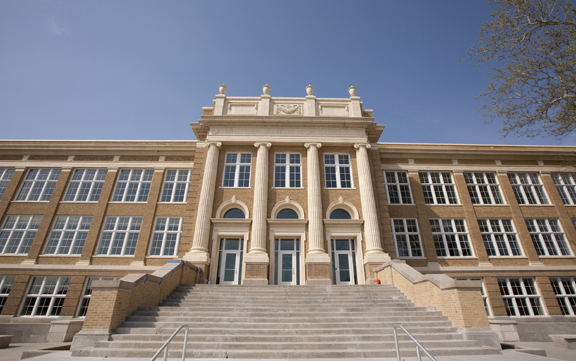
UNL has received an award for combining environmental design, historical preservation and sustainability into the renovation of Whittier Junior High School.
The Lincoln-Lancaster County Health Department presented UNL with the 2010 Environmental Leadership Award in the government category during a June 3 ceremony at the Nebraska Champions Club. Alan Wedige, the project manager in Facilities Planning and Construction who oversaw the Whittier renovation, accepted the award on behalf of UNL.
"We attempt to make our buildings more sustainable every day by trying new and creative things that are good for the university and the environment," said Ted Weidner, assistant vice chancellor for Facilities Management and Planning. "And, this award is further verification that the university is indeed building sustainable buildings."
Weidner cited the installation of the first ground coupled heat pump on either City or East campus, and UNL's greatest single-building use of LED lighting as primary reasons for the award.
Watch a video featuring workers putting the final touches on the Whittier remodel at http://go.unl.edu/855.
The annual Lincoln-Lancaster County Environmental Leadership Awards honor environmental stewardship and dedication to sustaining and improving the environment. Awards were presented in six categories: business and industry, education, community/non-profit organization, government, agriculture and individual citizen.
Constructed in 1923, Whittier was one of the first junior high school facilities in the United States. The building served thousands of Lincoln students over the years. The University of Nebraska Foundation purchased the building in 1983.
The renovation of Whittier is a multi-year, $23.8 million project that included the creation of the UNL Children's Center and an update to interior of the building.
During the award ceremony, the Whittier remodel was described as "a wonderful example of adaptive reuse and demonstrates how the university is working to learn and adopt sustainable practices through forward-looking construction design, policy and planning."
The Whittier renovation incorporated sustainable building guidelines outlined by the federal Leadership in Energy and Environmental Design program.
Conservation concepts followed in the renovation include: optimizing energy performance by installing high-efficiency water source pumps and using high-tech lighting and computer systems that control energy use; preservation of 75 percent of the building's existing walls, floors and roof, which reduced potential landfill waste; installation of air filters that reduce harmful particulates from entering the building; and the installation of water-saving devices that reduce overall water usage of the facility by 30 percent.
The award also cited green building practices used and the purpose for the UNL Children's Center, calling it "another great example of the strong leadership role the university can play in addressing economic, environmental and societal issues." Building practices cited included use of a system that meets "the toughest environmental standards for indoor air quality" and the use of furniture constructed with low-emitting, water-based finishes.
For more information on the Environmental Leadership Awards, go to http://go.unl.edu/cym.
More details at: http://go.unl.edu/855